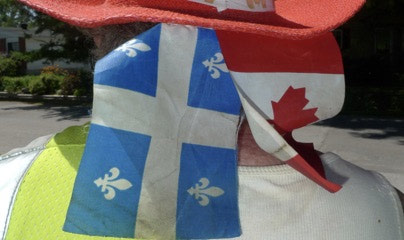Commemorative bench and tree program rejected by municipal council
Sophie Demers
During the October 17 municipal council meeting, a vote was taken on whether or not to adopt a commemorative tree and bench program. Council was divided but ultimately the program was rejected with nine voting in favour and 11 against. This came as a surprise, as earlier that day during the preparatory caucus, council voted in favour of an amendment allowing significant moments to be commemorated in the program as well.
In 2020, former Aylmer councillor Audrey Bureau tabled a motion that, among other things, included the creation of a program that would allow citizens to buy trees or benches and add a plaque to commemorate loved ones who have passed.
Bureau said she realized that this service was needed when an Aylmer family that had lost their son wanted to make a donation to the city to have something in a local park that commemorated him. At the time, there was no mechanism in place for the city to process this request.
After an analysis by the city administration, the program was presented to the municipal council on September 19 for their approval. The program proposal details that residents could submit the commemorative bench or tree application at any time of year. Then trees would be planted in the spring or fall, and benches and plaques would be added in the summer season.
According to Gilles Chagnon, Lucerne councillor, who advocated for the program with Audrey Bureau, parks are public spaces and are an ideal area to commemorate someone who has contributed to the community or someone who simply lived there.
“Families will be able to make use of their public places so that the community can remember the passing of these individuals in our city,” said Chagnon during the council meeting. “It will also help people cope better with their grief, knowing that an element of the park will pay homage to their loved ones.” During the preparatory caucus before the city council meeting, Marc Bureau, Parc-de-la-Montagne-Saint-Raymond councillor and supporter of the program, proposed an amendment adding the ability to commemorate a significant moment, not just a passing. The council voted in favour of the amendment.
Other councillors were unsure of the amendment and the program. Olive Kamanyana, Carrefour-de-L’Hôpital councillor, voiced her concern, asking if Gatineau has the adequate human resources to carry out the program.
“I find it unfortunate that the city council rejected a program that offered a service to citizens and responded to needs such as park infrastructure,” said Audrey Bureau. “The program presented very little risk to the city as the trees and benches are paid for by the citizens wanting to commemorate a loved one. I think the council's decision was unjustified as those who opposed the program did not propose amendments or changes to reach a consensus. It feels like people are playing politics to the detriment of citizens.”
Chagnon says he is unsure if the program will be put before the council again. “I am open to making changes to the program if necessary because I believe in its beneficial effects for bereaved families. But first we need to take the pulse of the council to see if there's any interest in reactivating it.”




